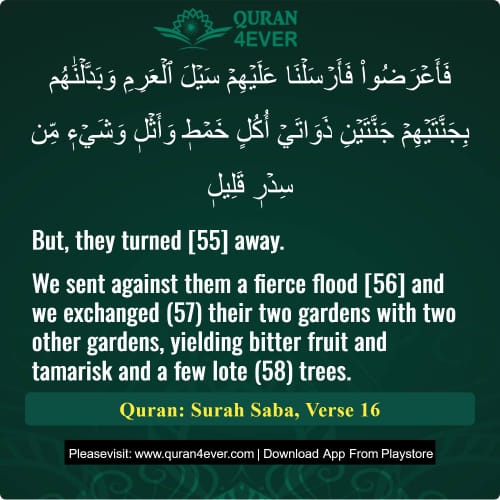
Transliteration:( Fa a'radoo fa-arsalnaa 'alaihim Sailal 'Arimi wa baddalnaahum bijannataihim jannataini zawaatai ukulin khamtinw wa aslinw wa shai'im min sidrin qaleel )
"But, they turned away [55]. So We sent against them a fierce flood [56], and We exchanged [57] their two gardens with two other gardens, yielding bitter fruit, tamarisk, and a few lote trees [58]."
Despite being reminded by thirteen Prophets of Allah’s favors, the people of Saba remained defiant. They rejected faith and denied the very blessings that surrounded them. This persistent ingratitude marked their turning away from divine guidance, even though they lived amidst clear signs of Allah’s bounty.
As a result of their denial, Allah sent a powerful flood known as Sayl al-‘Arim. It destroyed their lush gardens, devastated their homes, and buried entire cities under sand. Their land became a ruined wasteland, so notorious that even later Arab poets referenced its fall as a warning example of divine retribution.
The people of Saba had once enjoyed luxurious abundance, but their ingratitude led to the loss of everything. This shows a timeless truth: ungratefulness for divine favors results in their removal. Their fertile paradise was replaced with harsh terrain and barren ground—a lesson for all civilizations.
Allah replaced their gardens with bitter plants, tamarisk trees, and a few sparse lote trees—vegetation typically found in barren jungles, with tasteless or inedible fruit. The stark contrast from their former bounty underscores how divine punishment can turn comfort into hardship when His signs are ignored.
The tafsir of Surah Saba verse 16 by Ibn Kathir is unavailable here.
Please refer to Surah Saba ayat 15 which provides the complete commentary from verse 15 through 17.
(34:16) But they turned away[28] and so We let loose upon them a devastating flood[29] that swept away the dams and replaced their gardens by two others bearing bitter fruits, tamarisks, and a few lote trees.[30]
28. That is, they adopted the way of disobedience and ingratitude instead of obedience and gratefulness.
29. The word arim as used in sayl al-arim in the text is derived from the South Arabic word ariman, which stands for a dam. In the ancient inscriptions that have been unearthed in the ruins of the Yaman, this word has been commonly used in this meaning. For example, in an inscription dated 542 or 543 A.D. which Abraha, the Abyssinian governor of the Yaman, had gotten installed after the repairs to the great dam of Maarib, this word has been used repeatedly in the meaning of a dam. Therefore, sayl al- arim implies a flood that comes when a dam breaks.
30. That is, as a result of the flood that came after the dam burst, the whole land was laid waste. The canals which the Sabaeans had dug out by building dams between the mountains were ruined and the irrigation system destroyed. Then the same land which had been like a garden before became a jungle of wild growth and no eatable plants were left in it except the small plume like fruit of the lote bushes.
[1224]- i.e., caused by a break in their dam. Another meaning is "the overwhelming flood."

For a faster and smoother experience,
install our mobile app now.
Related Ayat(Verses)/Topics